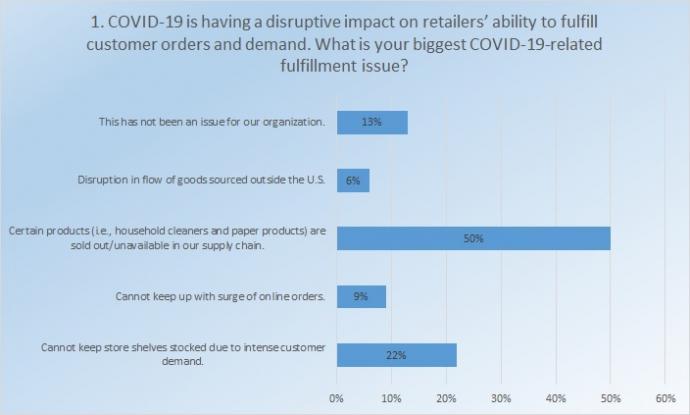
Get great content like this right in your inbox.
Retail executives are being tasked with learning how to navigate coronavirus-related retail issues within days, not months, leaving them looking for solutions to issues such as curb-side pickup, surging online orders, and stock outs, a March RIS audience poll finds.
RIS conducted an online survey March 18-24 to uncover a snapshot of the impact COVID-19 is having on our audience’s businesses. To start, the impact of the coronavirus outbreak on sales has been negative for some, but positive for more, the survey finds.
While 30% said there has been a negative impact on sales, 36% report a significant uptick and 6% report is has been a goldmine. Meanwhile 12% are still not sure of the impact and 15% said it hasn’t changes things.
Whether sales are good or bad, many report they are navigating operational issues.
Half of respondents said the situation is causing certain products to be sold out/or unavailable in their supply chain and 22% said they can’t keep store shelves stocked due to intense customer demand.
Retailers that are able to deliver orders are also facing challenges: 9% said they can’t keep up with the surge in online orders. While 47% of respondents said store closings or operations being limited by state/local ordinances hasn’t been an issue for them, 17% said supporting an increased demand for store-level delivery has been a challenge in dealing with closings/limiting operations.
Other issues that are cropping up are the challenge to maintain personalized customer relationships (17%), creating in-store or curbside pickup zones that meet CDC guidelines (13%) — one possible reason why Target’s sales are booming — and the ability to maintain corporate branding (7%).
The coronavirus has also brought up issues for retail employees. Respondents said preventing the virus among the workforce is the biggest concern (33%). However 18% are also worried about creating an infrastructure to support a surge in remote workers and offering payment, financial support and other services to employees who are temporarily displaced from their jobs. Finding extra staff to support increased demand is also a worry for 15% of respondents.





